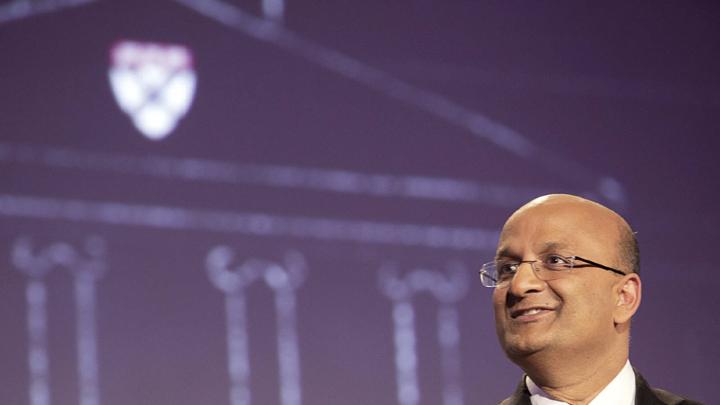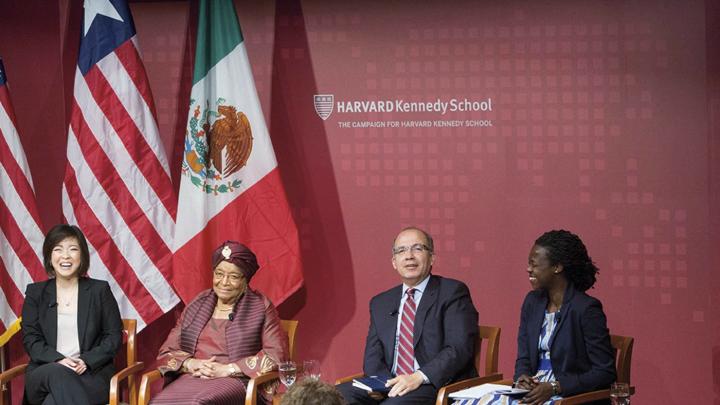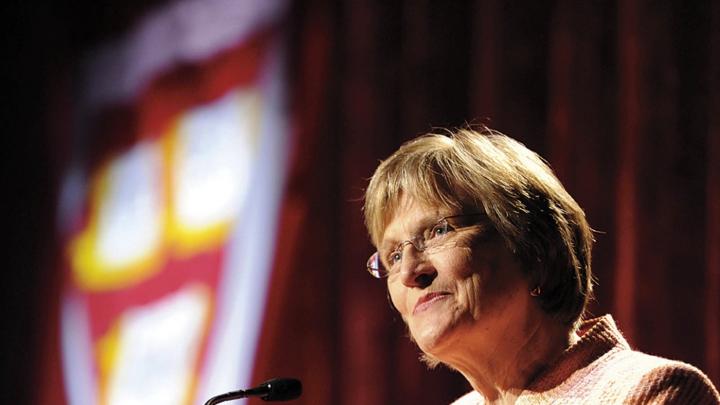The schools of business, dental medicine, divinity, and government announced their capital-campaign priorities and ambitions this spring. With their targets included, some $4.6 billion of the $6.5-billion Harvard Campaign’s aggregate goal has been detailed.
• Harvard Divinity School launched its $50-million effort “To Illuminate, Engage, and Serve” on April 4. Dean David N. Hempton emphasized new professorships (about one-quarter of the goal) in “global” subjects such as contemporary Jewish studies, the Hebrew Bible, women’s studies, Buddhism, and African-American religious studies. More funds for financial aid and interdisciplinary collaborations are on the list, but the largest priority is the renovation of Andover Hall, the school’s central facility, constructed as a seminary in 1911.
With material prosperity and instant gratification so often accepted as societal norms, said Hempton, who is also McDonald Family professor of evangelical theological studies, the core mission of Harvard’s founders—religion and spirituality—is often ignored. He called the divinity school the perfect institution to inspire today’s leaders to think about the most important questions in life, including death, the natural world, and spirituality, and President Drew Faust agreed: “Never have its subjects of inquiry felt more urgent—from the discussions of values and ethics buzzing across the graduate schools, to the tremendous appetite among undergraduates for the vexing question of how to live a life.”
For complete coverage, see http://harvardmagazine.com/2014/04/harvard-divinity-school-launches-capital-campaign.
• Harvard School of Dental Medicine quietly began its $8-million campaign at the downtown Harvard Club of Boston, on April 24. The school seeks financial-aid funds (75 percent of the goal; the average debt of a 2013 D.M.D. graduate was $162,000, noted the case statement), and support for global and community oral-health programs (25 percent), to give students and faculty members public-health experiences locally and in countries with great need, such as Haiti and Rwanda. Beyond the campaign goal, it also solicits support for professorships, laboratories and other spaces, and fellowships.
• Harvard Business School (HBS) began its $1-billion campaign (with more than $600 million already committed) much more visibly the next day, with case-based class discussions for alumni; student panels on innovations in the new experience-based curriculum; presentations on the iLab; and faculty-alumni panels on interdisciplinary research into social challenges such as healthcare, education, and energy policy.
Dean Nitin Nohria outlined five priorities: intellectual ambition (funding for the research initiatives, and related faculty growth and building projects; $250 million); innovation in education, including the experience-based curriculum, the HBX online venture, and executive education (see a project for the latter in Brevia; $200 million); international research, education, employment recruiting, and dissemination of Harvard Business Publishing products ($150 million); inclusiveness (financial aid and summer and postgraduate fellowships for social enterprise, entrepreneurship, and other pursuits; $150 million); and integrating with other parts of Harvard (including the iLab, cross-faculty teaching, and programmatic investments in Allston when the School of Engineering and Applied Sciences [SEAS] and other units locate next to HBS’s campus; $100 million). Nohria also hopes to secure $150 million of discretionary, current-use funds.
In remarks at a gala featuring spectacular video presentations about alumni experiences and leaders around the world, Faust said Harvard’s campaign was “about leadership”—the core of HBS’s mission. Citing the school’s pioneering history, including the case method and such fundamental concepts as the value chain and disruptive innovation (see the profile of Clayton Christensen), she observed that pressing problems of economic and political development and scientific discovery “all demand approaches and solutions” grounded in organization, management, and innovation. Nohria, the final speaker, encompassed HBS’s aims by emphasizing educational innovation, with a succinct, forward-looking tagline: “Let’s begin.”
Read a full report at http://harvardmagazine.com/ 2014/04/harvard-business-school-campaign.
• Harvard Kennedy School’s (HKS) $500-million drive (with nearly two-thirds already pledged) launched during two symposium-filled days on May 15 and 16. In an interview, Dean David Ellwood reflected on governance at a time when the public is disillusioned, noting, “The American people have never been enamored with government, but what’s unique about this moment is that we face a series of quite troubling public challenges”—middle-class stagnation, climate change, even threats to democracy itself. HKS students, he stressed, are “people who’ve really been in the world of practice.”
On May 15, the president of Liberia, Ellen Johnson Sirleaf, M.P.A. ’71, LL.D. ’11, and Felipe Calderón, M.P.A. ’00, K ’03, the former president of Mexico, demonstrated that point in discussing leadership. Asked what prepares a leader for coping with difficult decisions, Sirleaf replied, “There’s nothing…other than your inner will to make a decision. That is difficult. You find out what you have within you.” Calderón noted that “once a decision arrives on your desk, it is there because it is a difficult one. Often, your choice is between the lesser of two evils.”
When Faust spoke, she praised the school for its global footprint and interdisciplinary work. Ellwood also touched on those attributes, in part, in outlining the school’s four campaign priorities: “reaching the very best leaders” (by developing financial-aid resources); “transforming the educational experience” (with multidisciplinary and experiential learning and teaching technologies); “generating powerful ideas” (a rubric focused on “making democracy work; creating shared, sustainable prosperity; [and] harnessing the forces reshaping our world”); and “creating a campus that amplifies our mission” (including a major new building and the renovations to support “active, engaged learning, and group work”).
Read a full report at http://harvardmagazine.com/2014/05/kennedy-school-capital-campaign.
• In other campaign news, reunion gifts and other pledges (see “Alumni Gifts,” a report on notable results, unveiled during Commencement afternoon) brought the University its first $1-billion year for donations and commitments—a goal reached in the past, according to published reports, only by Stanford during the end of its most recent campaign.
Among notable announcements, the Faculty of Arts and Sciences disclosed a $17-million donation from the Pershing Square Foundation—founded by Bill (William A.) Ackman ’88, M.B.A. ’92, CEO of the Pershing Square Capital Management hedge fund, and Karen Ackman, M.L.A. ’93—for a “foundations of human behavior” initiative grounded in behavioral economics and other disciplines. That gift provides for three new professorships and a research fund. The Ackmans separately disclosed $9 million of additional giving, including a medical-school professorship in global health and $5 million for men’s crew travel expenses. See http://harvardmagazine.com/2014/04/pershing-squares-ackman-funds-harvard-initiative for more information.
Autumn will bring announcements from the schools of design, education, law, and medicine, and additional sums are being raised centrally, as University priorities, for projects such as the new SEAS quarters in Allston. But for the moment, speaking before an audience of some 600 guests at a New York City fundraising gala on May 14 aboard the battleship/museum Intrepid, Faust brought the academic year’s formal campaign events to an end by recapitulating the themes of her September 21 kickoff address. She especially emphasized investing in knowledge—in particular, interdisciplinary research in the applied sciences and engineering. (She offered an extended illustration of a recent discovery involving microrobotics.) She also disclosed that some $430 million had been raised toward financial aid, a principal campaign goal (she did not detail other results by function), and spoke of Harvard moving from being “inherently global to intentionally global” in curriculum and research. If the capital-project goals are met, she said, hundreds of thousands of square feet of construction will be under way in Allston by the campaign’s end (for the new engineering and applied sciences facility), moving the University toward a future including a unified campus—with the Charles River running through it—by the time of its four-hundredth anniversary, in 2036.










